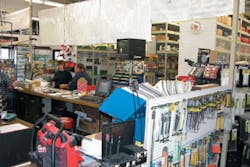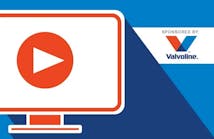If you build it, they will come." That's the famous line from Field Of Dreams, but the same ideal seems to apply to Dennis Funderburg and Dayton Tool Crib. While most successful tool distributors operate from a showcase on wheels, Funderburg has used many of the same principles in growing his tool and equipment business from a stationary store front.
Funderburg and his wife Beth purchased the business from Dave Casey in December of 1998, but the store's origins go back about 20 years to when Casey, a full-time firefighter, started selling tools on a part-time basis. The business earned a name for itself by carrying odd and unique products that professionals and serious do-it-yourselfers couldn't find anywhere else.
Despite some strong roots in the community, the store's previous owners started going in the wrong direction when an influx of big box retailers moved into the area. They responded to this competition by introducing lower-priced, lesser-quality import tools that were not designed for professional use.
This translated to fewer sales and a deteriorating reputation, but Funderburg saw an opportunity to transform the business into a high-quality store that sold "the good stuff". Based on his previous retail experience selling agricultural parts and equipment, he knew the benefits of stocking products that combined quality with an attractive price point. Additionally, Dayton Tool Crib already had one vitally important factor, especially for a retail business, working in its favor - a great location in terms of proximity to major highways and population centers.
"The first thing I did was to get rid of a lot of junk," states Funderburg. "From the beginning our focus has been on having fair prices, not necessarily the lowest. The difference is that you're selling yourself as much as anything because you have to justify why the price is where it's at," he explains. So instead of price, Funderburg committed his approach to product quality, greater availability and customer service.
The strategy seems to be paying off, as Dayton Tool Crib has seen steady, annual growth of around 20 percent since the Funderburg's took over. This growth has lead to plans for expanding the store's 7,200 square feet of retail space. "We need more display space as our inventory grows," explains Funderburg, "because 90 percent of what we have is on the floor. And if the customer can't see it, they won't buy it."
A Full Crib
The nature of Dayton Tool Crib's business depends on customers coming to them, as opposed to taking the business to the shop. To make the visit more attractive, the store's inventory is extensive, and lends well to product categories that some mobile distributors struggle with or avoid, such as chemicals (brake cleaner, WD-40, caulk, paint etc.) and capital equipment. "In all, we work with about 600 different lines," states Funderburg.
Dayton Tool Crib's customers are primarily light automotive and heavy truck repair technicians, but they also service some independent parts stores, industrial accounts, government fleets, construction workers and a handful of local mobile tool dealers and wholesale stores.
"We recently expanded our inventory to include some construction products," continues Funderburg, "which has brought in some additional sales, but they usually require delivery. And this can cut into our normal profit margin." Examples of these new products include hammers, levels, ladders, rope, winches, hardware, bungee cords, duct tape, butane, table saws, job boxes and batteries.
Automotive tools and equipment comprise about 80 percent of their product mix, but availability of the other stuff helps reinforce two of the main principles behind Dayton Tool Crib's success.
"With everything under one roof, we've positioned ourselves as a one-stop shop. This is attractive to the customer base for obvious reasons, but we benefit from a supermarket type of effect. Customers come in for one thing, but then they walk around and end up leaving with other, often unrelated products. This is especially true when we have our annual SK sale. People come for SK Hand Tools, but it really ends up driving sales of everything else because people get in the store, start looking around, and leave with much more than what they came for," states Funderburg.
An expansive inventory also helps promote Dayton Tool Crib throughout the area. "Word of mouth is a big reason for our growth," cites Funderburg. "An example was this 48" pipe wrench we sold one time. We had it in stock for a while, but when we finally sold it I know that customer talked about us to other people because he had such a hard time finding that anywhere else.
"It really comes down to doing things that no one else can. That's how we've built a name for ourselves. We also listen to our customers and make sure to carry the more common products that they regularly need and want, - at a fair price."
Understanding what their customers need and want can also be seen by a number of the services they provide, and approaches that Dayton Tool Crib uses.
- Tool repair. Relying on his affinity to tinker, and background as a technician, Funderburg and counterman Bill Romine repair everything from hand and power tools to rivet guns and pressure washers.
- Counter displays. Dayton Tool Crib showcases different products on the counter, usually new or seasonal tools and equipment.
- They do their own catalog and use some direct mail in communicating with customers.
- Funderburg cites that Dayton is an "old car town", meaning that a lot of his customers, as well as the general public, have a vehicle they're working to restore. Therefore, the store is kept simple, clean and organized in attracting weekend mechanics that generate a significant amount of walk-up business.
- Because he carries a more professional and higher-priced collection of tools, equipment and supplies, Funderburg really doesn't compete with the local Home Depot or Harbor Freight big box store. As a result, he capitalizes on referral business from them.
Although Funderburg has benefited from a previous life in retail, his approach in making Dayton Tool Crib a success has more to do with understanding customers than managing people or margins. He explains the premise of Dayton Tool Crib's success this way:
"Once you understand the customer and your niche in meeting their needs, everything else is just taking steps to match supply with demand. In our case that's providing a breadth of quality products at fair prices, and then standing behind what we sell and service."
By The Buy
Like any small business owner, Dennis Funderburg understands selling right comes from buying right. For automotive tools and equipment he strives for a 40 percent margin, with 90 percent of his inventory coming directly from the manufacturer. The remainder is filled by larger warehouse distributors. His primary sources are K-Tool and Stampede Tool Warehouse.
"We use them for some unique requests, volume purchases, or when we need to fill an order immediately. I know that if we get them an order by 3 p.m. it'll be in the customer's hands the next day," explains Funderburg. On the construction side the margins shrink to about 26 percent, with 70 percent of inventory coming direct from the manufacturer.
"My buying decisions are based on the situation, and whatever provides a better price per product. I also take the level of service into account when deciding who I want to work with. If I'm replenishing stock, then it makes more sense to buy direct in larger volumes, but if it's filling a special request or making sure the customer's needs are met the next day, then I'll work with a larger distributor," continues Funderburg.
Additional buying and selling tips from Funderburg include:
- "Know your margins, and keep them at 30 to 40 percent.
- "Look long-term in building inventory. Look at what you're paying now, taking into account things like storage costs and a lack of cash flow, versus the price in 6 to 8 months.
- "About 55 percent of our business is cash, but 45 percent of our customers hold a charge account. These store accounts are for people we know personally, as well as for corporate and government accounts.
- "We use a combination of relationship and proactive selling, depending on the product and customer, as well as the salesperson's knowledge of both.
- "There are some simple cost-cutting practises that we've found very useful. One is using on-line banking, so the bank mails our payments for free. We also contract directly with the credit card companies for rates, instead of card service resellers like the bank. The rate difference can be significant. "


